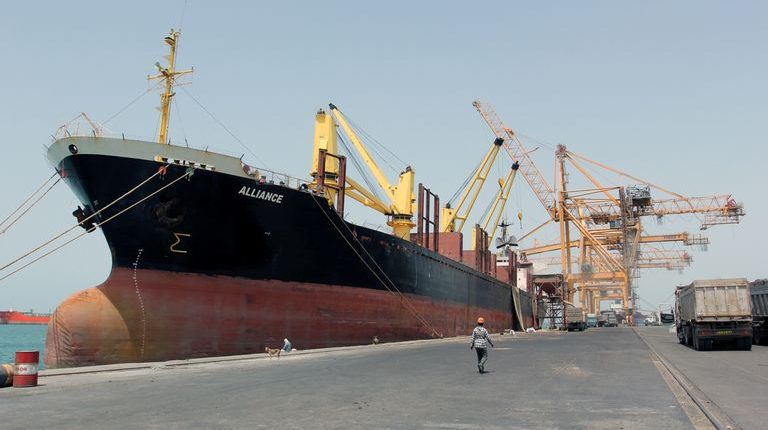Attacks on commercial ships in the Red Sea risk pushing up the price of oil and other goods, analysts have warned.
Several firms have paused shipments through the route after vessels were attacked by Houthi rebels in Yemen.
The world’s second-largest shipping line, Maersk, said on Tuesday that it would reroute some of its vessels around Africa’s Cape of Good Hope.
The disruption has led the US to launch an international naval operation to protect ships in the Red Sea route.
Countries joining the security action – named Operation Prosperity Guardian – include the UK, Canada, France, Bahrain, Norway and Spain.
US Defence Secretary Lloyd Austin held a virtual meeting with ministers from more than 40 countries on Tuesday and called on more nations to contribute to the security efforts.
“These reckless Houthi attacks are a serious international problem and they demand a firm international response,” he said.
The UK’s Ministry of Defence said the Royal Navy destroyer HMS Diamond would join the new task force, with the security situation “deteriorating”.
The Red Sea is one of the world’s most important routes for oil and liquefied natural gas shipments, as well as for consumer goods. It is bookended by the Bab al-Mandab Strait – also known as the Gate of Tears – in the south near the coast of Yemen and the Suez Canal in the north.
Houthis have declared their backing for Hamas in its war with the Israelis and the rebels based in Yemen said they were targeting vessels which they believe are heading for Israel.
However, some firms, such as Investor Chemical Tankers, whose Swan Atlantic vessel was attacked on Monday, said that its ship had no links to Israel.
Despite the launch of the international operation to ensure safe passage through the Red Sea, Maersk said it was not clear when it would resume journeys along the route.
Maersk said “A case-by-case assessment will take place to determine whether adjustments need to be made – including diversions via the Cape of Good Hope and further contingency measures”.
It said while it was pleased to hear of international efforts to improve security in the area, “at this time it remains difficult to determine” when it would return to the Red Sea route.
Meanwhile, Hapag-Lloyd, a German firm whose Al Jasrah vessel was attacked last Friday, said that while it welcomed the new task force, the company needed 100% assurance the Red Sea was safe for ships to return.
The alternative route, around the Cape of Good Hope, adds about 3,500 nautical miles to the journey and takes about 10 days longer.
Attacks on ships have intensified in recent days. Investor Chemical Tankers said its Swan Atlantic tanker was hit by an “unidentified object” on Monday, while Maersk described the situation as “alarming” on Friday after a “near-miss” incident involving Maersk Gibraltar and another attack on a container ship.
Oil giant BP said on Monday that it would temporarily pause all shipments of crude through the route. Rival energy giant Shell has yet to comment.
At the moment, changes to the oil price have been minimal. Prices rose 1% on Monday, but on Tuesday they were little changed with benchmark Brent crude trading at around $78 a barrel.
As petrol is derived from oil, increases in the price of crude usually feed through to higher costs at the pump.
Richard Meade, editor-in-chief of shipping newspaper Lloyd’s List, told BBC Radio 4’s Today programme: “What is going to be very interesting is if the tankers continue to reroute.
“That’s a much more finely balanced market that could have serious implications for the global supply chain.”
But rerouting will affect more than just oil. Mr Meade said 12% of global trade was taken through the Red Sea, which is about $1 trillion worth of goods a year.
“We’ve seen most of the main container carriers – these are the ones that carry finished goods, TVs, electronics, trainers – they have almost exclusively started rerouting,” he said.
Hapag-Lloyd told the BBC that it would have rerouted 25 ships by the end of the year, costing it tens of millions of dollars as the ships were booked before the attacks. However, it said new orders would “probably” see a rise in costs.
“This industry is keeping world trade alive and attacks on merchant shipping are unacceptable,” said Hapag-Lloyd’s head of corporate communications, Nils Haupt.
Marco Forgiona, from the Institute of Export and International Trade, told the BBC that rerouting would increase fuel and insurance costs for shipping, “and then you’ve got the issue that the ships are in the wrong place, the containers are in the wrong place and you get the potential for congestion at the ports and further delays”.
S&P Global Market Intelligence said that nearly 15% of goods imported into Europe, the Middle East and North Africa were shipped from Asia and the Gulf by sea. That includes 21.5% of refined oil and more than 13% of crude oil.
A rise in oil prices can lead to higher inflation, which measures the pace of price rises. Inflation has been falling in the UK and is currently 4.6%.
New figures out on Wednesday will show whether it has continued to drop but, at the current level, it is still more than twice the Bank of England’s 2% target. The Bank has, until recent months, been raising interest rates to cool inflation.
‘Not acceptable’
Houthi rebels have been targeting ships travelling to Israel, using drones and rockets against foreign-owned vessels.
“The ballistic missiles are really the tough one. This is the first time we’ve ever seen ships hit by this type of weapon,” Sal Mercogliano, a naval historian at Campbell University, told the BBC.
“It’s a very difficult type of missile to shoot down. And if that’s the threat that the ships are facing, many shipping companies may decide not to go that way.”
The International Maritime Organisation (IMO) said it was “closely monitoring developments”.
Source:bbc.com





